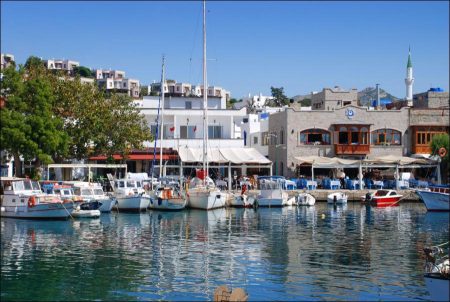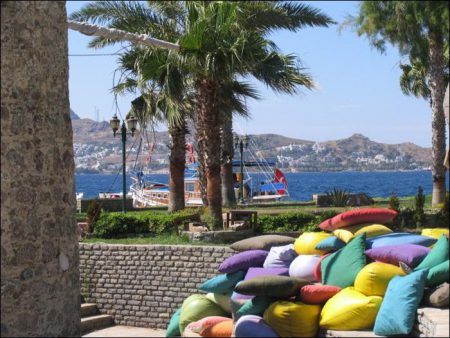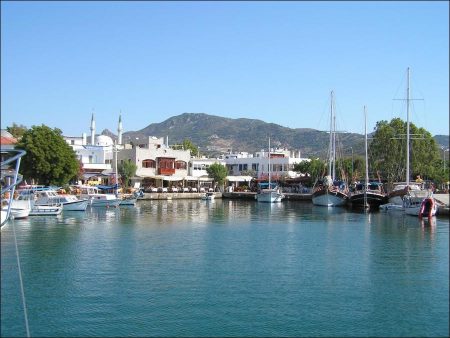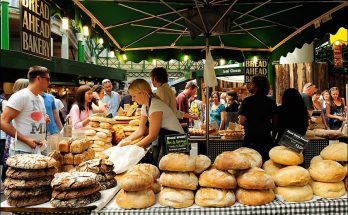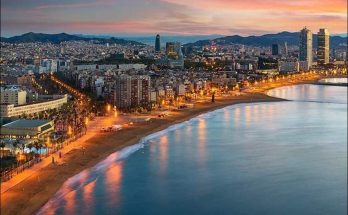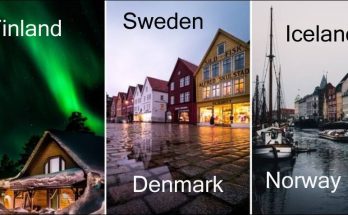Palm trees, pretty flowerbeds, dainty white villas, narrow cobblestoned streets, outdoor markets bursting with colour and aromatic herbs, rustic stone work, quaint little restaurants along the shore, majestic wooden sailboats, crystal-clear water, deep-blue skies, blissful tranquility, hot sunshine and a gentle sea breeze. You’d be forgiven for not guessing that this is Turkey—a rare blend of picturesque beauty and low-key living that is surely one of the Mediterranean’s best-kept secrets.
Unlike most of coastal Spain, France, Italy and Greece, the Turkish Riviera has retained its authentic personality, with almost no high-rise apartment blocks, no boom-boxes belting out loud music, no hawkers and no commercial sell-out to invading British tourists and expats. Here, on the Bodrum peninsula, Turks still rule. Many speak only rudimentary English, if any at all, but their friendliness and warmth are a language everyone understands. You want rent car? No problem; I have friend help you.
The small picturesque village of Yalikavak, on the westernmost tip of the Bodrum peninsula, is a prime example of this untainted paradise. There is none of the frantic commercialism that you’d expect in such a beautiful coastal resort, and the haunting strains of the muezzin are a regular reminder that this is a country still firmly rooted in Muslim culture and traditions. Respect, friendship and a dedication to service seem high on the list of Turkish values.
It is impossible to wander along the promenade without making at least half a dozen friends – restaurant owners who love to chat, cook whatever you want, and help in any way they can. They work seven days a week, 12 hours a day and still have a smile, quick wit and a warm handshake – whether you eat at their restaurant or not.
Masters at multi-tasking, the Turks are natural entrepreneurs. Like many of the restaurant owners, Halil seems to use his restaurant as a base for a whole series of other businesses—selling marble to the construction industry, finding homes for tourists and expats, renting cars and even offering to bargain on your behalf if you want a good deal on some purchase.
Omer will lend you his car ‘for a special price’ and, man to man, will give you invaluable tips on how to dress and shave for a more macho effect. While his staff serves dinner, Hazik will give you an expert deep-tissue massage, regaling you with his seemingly endless repertoire of Turkish jokes. His favourite is the one about kissing a woman’s hand—a common greeting in Turkey: “Ask a Frenchman why the Turks do this and they will reply that it’s a mark of respect for women; ask an Englishman why they do it and they’ll say that it’s a quaint romantic form of flirting; but ask the Turks why they kiss a woman’s hand and they will say, ‘Well, you have to start somewhere.’”
The Turks seem to have a deep appreciation for the natural environment, holding fast to the traditional style of housing, with painstakingly crafted stone work and crazy paving. The hillsides are dotted with white villas, brilliant blasts of bougainvillea spilling off their balconies and trailing lazily along wooden balustrades. At night, the only sounds in the villages are cows mooing, owls hooting and dogs barking at a passing car.
Refreshing though it is, there is a downside to this unyielding Turkishness; westerners who are used to being able to buy whatever they want, wherever they go, will not feel so well catered-to here. Many specialty products—such as gluten-free foods, natural supplements, and organic produce—are unavailable in many parts of Turkey. A ferry trip to the neighbouring Greek islands of Kos and Samos can remedy this, while providing a sobering reminder of the relatively high cost of living in Euro-currency countries. Turkey, though a hot contender for membership to the European Union, remains this side of the divide, with its own currency—the Turkish lira (roughly equivalent to CAD$0.50)—keeping prices lower than in most other European countries.
While the inefficiency and red tape involved in getting a phone line installed would try the patience of a saint, the Turks are surprisingly sophisticated in certain domains. In health care, for example, they leave other countries in the dust; most medications can be purchased for under TL10 (about CAD$4.50), and laboratory test results are delivered to you within 10 or 20 minutes—for a fraction of the price you’d pay in North America or other parts of Europe. If you need to get some bottled water or a gas tank delivered, you can expect it within 10 minutes of placing your order by phone. And if you’re worried about mosquitoes pestering you on hot, sweaty nights, you can relax in the knowledge that the local authorities regularly spray the area to keep the pesky whiners to a minimum.
Visits: 102
